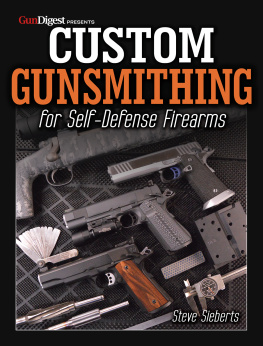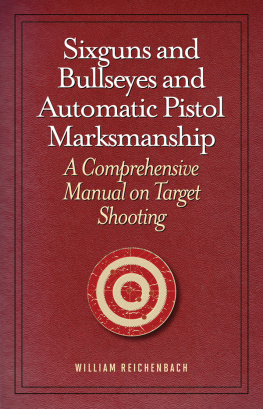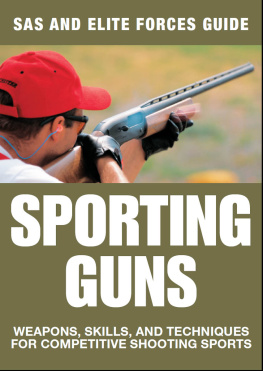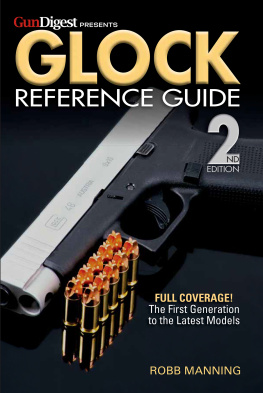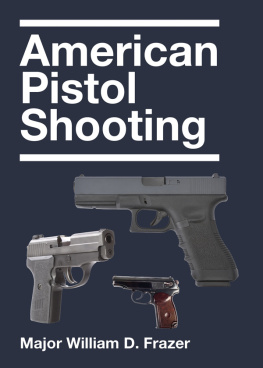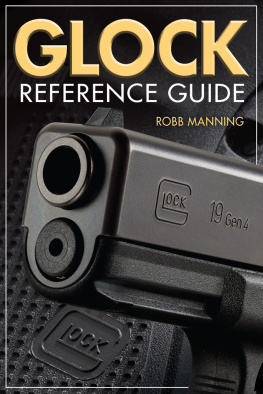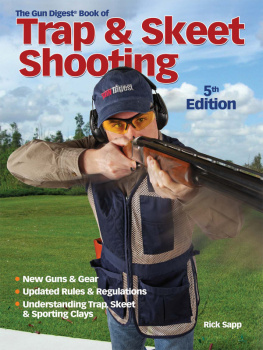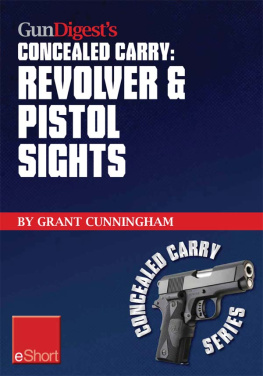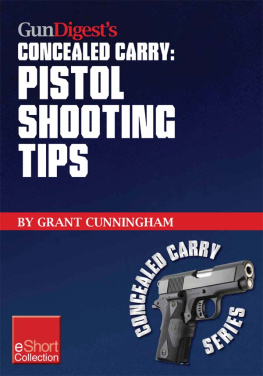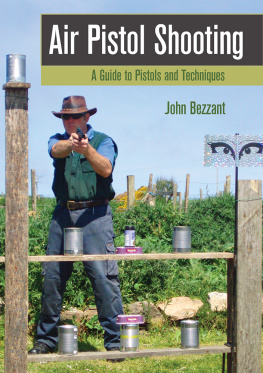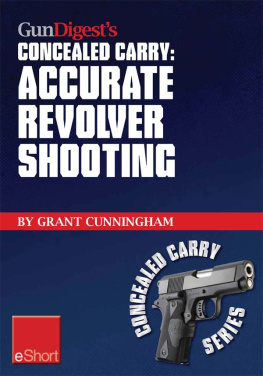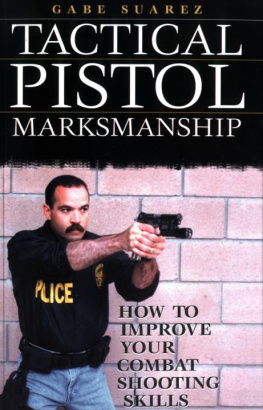Thank you for purchasing this Gun Digest eBook.
Sign up for our newsletter and receive special offers, access to free content, and information on the latest new releases and must-have firearms resources! Plus, receive a coupon code to use on your first purchase from GunDigestStore.com for signing up.
or visit us online to sign up at
http://gundigest.com/ebook-promo
DEDICATION
No book of this nature would be possible without the influence and contributions of many people. Many authors dedicate their books to their parents or their teachers, and Im no exception. My grandfather was an Army veteran and a doughboy in the War to End All Wars. He came through that war and the Great Depression, learned the values of hard work, humility and reverance, and passed those traits down to my dad. My dad was a Navy veteran of WWII and Korea, who, after WWII, worked in the aerospace industry for three decades, doing his part to help win the Space Race. They both had a work ethic and focus for the mission that was passed down to me.
I became involved in competitive shooting in the mid-70s when I joined the Southwest Pistol League, the precursor to the USPSA. I then became a paratrooper with the 82nd Airborne Division, later became involved with the U.S Army Marksmanship Unit, and eventually achieved the Distinguished Pistol Shot Badge, the Presidents Hundred Tab, and the NRA 2600 pin. I would like to think that the qualities of perseverance, hard work, dedication and focus that were traits of my dad and grandfather allowed me to achieve those shooting goals.
I also would not have achieved my shooting goals without the influence of two early coaches - M/Sgt Oscar Gomez of the Ft Bragg and XVIII Airborne Corps Shooting team, and SFC Ron Martere, Head Coach of the Army Marksmanship Unit - in the early 80s. M/Sgt Gomez taught me the importance of the fundamentals of pistol marksmanship, and how to apply those fundamentals in a consistent way in order to achieve winning results. He also taught me the importance of mental discipline and how that particular shooting fundamental becomes more critical as the shooters skill progresses. SFC Martere gave me the opportunity to shoot with the Army team over the course of four seasons; he taught me how to compete at a high level, and how to overcome the anxiety known as Match Nerves. SFC Martere really ingrained in me the solid shooting fundamentals that I still carry and apply in shooting competitions today.
Finally, I would like to dedicate this book to my wife Lori, who has given me untold amounts of encouragement in my career over the years, and my two incredible kids, Kyle and Kelly, who have shown me what really matters in life, and constantly fill my wife and I with pride and amazement with their own accomplishments in sports and music.
CONTENTS
PREFACE
Shooters new to competitive shooting sports may not have heard of Doug Koenig, but in the world of sport handgunning there is no bigger name.

According to Doug, Traveling with a local group of guys to all of the matches was just like being at hunting camp every weekend.
If there is a good analogy to Dougs shooting accomplishments, it would have to be similar to what Peyton Manning has done in football and Arnold Palmer in professional golf. Doug holds more than 70 national and world pistol championships, including 16-time Bianchi Cup winner, 3-time World Speed Shooting Champion/Steel Challenge, and 10-time World Champion. He is widely considered to be the best all-around shooter in the world. Doug graciously spent a little time putting his thoughts together for the following contribution shortly after winning his latest Bianchi Cup Championship (2015). I asked Doug a few questions about competitive shooting and this is what he said:
1. Why did you become a competitive pistol shooter? I was drawn to competitive shooting because the hunting season was too short. I was looking for an alternative outlet that would give me the same level of excitement and adrenaline rush I experienced with hunting. Plus, I loved shooting in my back yard whenever the occasion arose.
2. How did you get started in competitive pistol shooting? There was a gun store nearby my home that my dad and I visited regularly. When I was 17, my dad accompanied me and I ordered my first handgun from Frank Behlerts store. Being anxious, Id stop there every day to see if my pistol had arrived. Frank would show me USPSA and IPSC course books from recent matches he had competed in while explaining to me the different type of gear necessary to compete. Listening to him and asking questions got me super pumped up, so eventually Frank lent me some gear and invited me to a match in Ledgewood NJ in 1986.
Despite it being 17 degrees outside and snowing, I had the time of my life. It was a blast and I knew I was hooked. From then on all I wanted to do was to shoot, not to beat other competitors or become a professional, but just to shoot because I was having so much fun. Traveling with a local group of guys to all of the matches was just like being at hunting camp every weekend.
3. What makes competitive pistol shooting such a great sport? Simple, its FUN! What makes competitive pistol shooting such a great sport is that you control the outcome of the matches and your score. You dont have to rely on anyone else or referees, you control and are responsible for your outcome. Competitive shooting also teaches you great mental and physical discipline. To be a top level performing shooting athlete, you must work hard to develop all of your skills - shooting, physical and mental. Even if you dont aspire to be great, you can still use the skill sets learned from shooting in your everyday life. Most importantly, be safe and have fun.
4. What advice would you give the new or upcoming competitive pistol shooter just getting started, or wanting to get started, regardless of what form of competitive shooting they wanted to get into? I think the best advice for a potential new shooter is to visit and attend several local matches, watch and talk to the shooters. Everyone is always eager to talk about their sport and theyll go out of their way to introduce someone to the shooting sports. Its a great way to look at the many different types of customized guns, while handling them in the safety areas. Pick the gun that best fits your hands and feels comfortable. A great online resource to check out is NSSFs website, www.WheretoShoot.org, youll find a list of local clubs and what type of shooting discipline they offer. The NRA also has many helpful resources on their website that can steer a new shooter.
INTRODUCTION
The spirit of healthy competition is not unique to the shooting sports. Man versus Man competitions probably go back to when Grok the caveman challenged Hruk, his cave neighbor, to a rock-throwing contest. Mankind has been challenging each other in grueling, arduous and sometimes silly forms of competitions for millennia. The Olympics comprises 28 sports, 300 events and over 10,000 athletes. The shooting sports are represented in the Olympics with such events as the biathlon, which combines cross-country skiing and smallbore rifle shooting, and the handgun events are represented in free pistol, air pistol and rapid-fire pistol. Clearly, shooting, specifically handgun competition, is done at a very high level. What I find amazing is that the marksmanship fundamentals - sight alignment, trigger control and mental discipline - are the same whether employed by world-class athletes in an Olympic sport or the weekend bullseye shooter, casual plinker or 12-year-old junior shooter at a local USPSA match.


